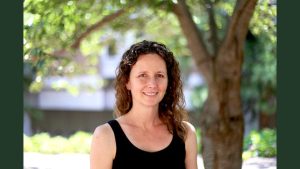Professor Hilary Lithgow has been involved with book groups for veterans since 2015. In 2015, the National Endowment for the Humanities wanted to expand their medical reading group to veterans. Prof. Lithgow started a book group for veterans with John Howell, a 2014 honors graduate of ECL and veteran National Guard medic.
The group reads mostly short pieces—poetry, short stories, excerpts from longer books—in order to read and discuss each piece deeply. Currently, they are reading Slaughterhouse-Five, dividing it into sections and holding mini meetings. In the past, they have read a mix of classic literature (like Catch-22 and The Red Badge of Courage) and other texts like The Fighters by C.J. Chivers and The Forever War by Joe Haldeman.
Prof. Lithgow became involved with Carolina’s Transforming Health and Resilience in Veterans Program (THRIVE) last spring. THRIVE holds a three-week intensive outpatient program for veterans and first responders, which includes a reading group as part of its treatment. In THRIVE’s reading group, Prof. Lithgow facilitates discussions of texts like Karl Marlantes’s What It Is Like to Go to War, David Morris’s The Evil Hours, and Brian Turner’s poem “At Lowe’s Home Improvement Center.”
Prof. Lithgow hopes that both reading groups lead to self-understanding and self-reflection for veterans. She has seen how reading literature gives veterans the language to discuss their experiences, showing them that, as Marine veteran Phil Klay has written, “a vocabulary exists” for something that seems incommunicable. Especially for those participating in the THRIVE group and reading these texts as part of a protocol, Prof. Lithgow hopes that veterans will make a discovery about the power of language. This discovery often leads to writing, and the third week of the THRIVE program involves sharing this writing with other members and with family. Furthermore, Prof. Lithgow says that discussing literature can be “very intimate without being invasive.” This intimacy allows group members to build social bonds and connections with each other and with their families who join the group in the third week.
Working on these sessions for veterans has impacted Prof. Lithgow tremendously: “I have always been interested in finding ways that literature can be useful outside the classroom. English classrooms started out as exegesis—people trying to discover insights from a sacred text—and these reading groups feel very much like that. I see this process happening often in the classroom, and these reading groups are one way to bring this literary discovery outside of the university.”
THRIVE is open to veterans of all branches. Veterans do not have to be retired, and the program is free. To learn more about THRIVE or to become involved, view the website here or email Prof. Lithgow at lithgow@ad.unc.edu.


